Diplomatic Events
- Details
- Written by Silvia G Golan
At the beautiful Dan hotel in Tel-Aviv gathered Ambassadors, business men, CEO's and other honorable people to celebrate the Korean national day and the opening of Korean food week.
The Korean Ambassador, Mr. MA Young-Sam, received all the guests in a traditional and colorful Korean wear, as well as his wife and the rest of his family.
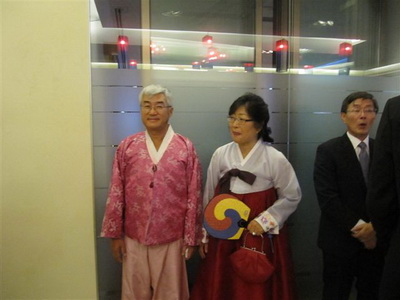
The evening started with a choir assembled with Korean children singing the Israeli and Korean anthems.
Afterwards the Korean Ambassador, Mr. MA Young-Sam, spoke to the crowd and welcomed them to the Korean national day and the opening of Korean food week.
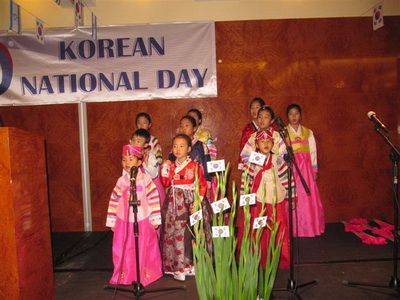
Ambassador Young-Sam Spoke about the special relationship between Israel and Korea, he mentioned the Korean War and the founding of the Israeli state, he talked about the economic crisis of 2008 and how Israel and Korean were the two countries who coped the best with this economic storm and came out stronger.
Mr. Young-Sam spoke of the great technological, educational and agricultural cooperation between the two countries and said that the Israeli- Korean bond is growing stronger each day.
Mr. Ambassador MA Young-Sam, had said that his tennis partner is Mr. Yuli Edelstein, as they are currently at a tie situation and they will have a deciding match soon. Mr. Edelstein is practicing every day, according to Ambassador Young-Sam.
The Ambassador finished with good news, as he said that a new 3 acres property in Herzliya Pituah has been approved to build the new Korean Embassy.
After the Ambassador's words, the government representative, welfare minister Mr. Yitzhak Hertzog, spoke to the crowd. Such as the Ambassador, Mr. Hertzog spoke of the brave relationship between the two nations and wished that the vast cooperation will continue and grow.
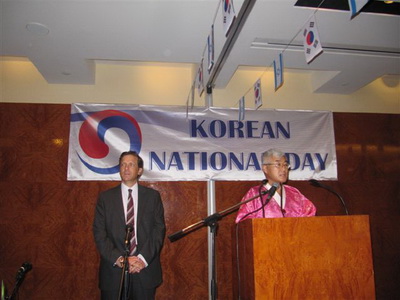
Mr. Hertzog had said that the Korean and the Israeli people are similar and both of the countries have to deal with security, economic and other challenges every day.
After the speeches the crowd was welcomed to enjoy varies types of Korean food and the Ambassador made sure he won't miss a picture with anyone who desired.
Photo Silvia Golan
- Details
- Written by Silvia G Golan
The lovely Ralli Museum in Caesarea was the host of the 185th Uruguay's national day.
The event started as the Ambassador of Uruguay, Mr. Bernardo Greiver, received all the guests accompanied by consul Alberto Rodriguez Goni and their wives.
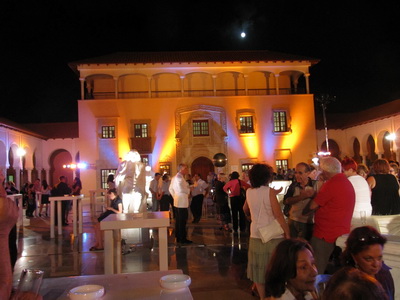
The evening started as the anthems, both of Uruguayan and Israeli were played. The Ambassador, Mr. Greiver, and the Ambassador of Spain, Mr. Alvaro Iranzo, sang the Israeli anthem in Hebrew.
After the anthems, the Ambassador Mr. Greiver spoke to the crowd and welcomed them to the 185th Uruguayan national day event.
Ambassador Greiver spoke in fluent Hebrew, as he was mentioning the special bond between Israel and Uruguay, the fact that Uruguay was the 4th country in the world that recognized the state of Israel, four days only after the declaration of independent.
Mr. Ambassador Greiver spoke of the wonderful cooperation that both of the small countries possess, in the field of education, agriculture, technology, and many other areas.
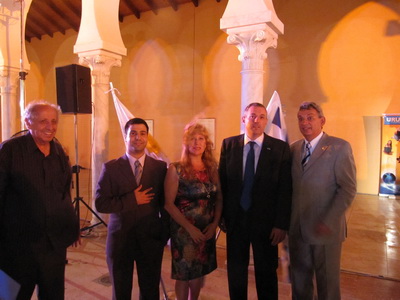
At the end of his speech, Ambassador Greiver gave original and rare documents to Muki Tzur, documents that had belonged to his father, the first Israeli Ambassador to Uruguay, Yaakov Tzur.
After the Ambassador's words, Muki Tzur took the stage and spoke in Spanish of his memories from the time of the Declaration of independence, memories of his father and about the importance of the documents. Muki Tzur's speech was emotional and moving and the crowd listened carefully to the stories of new born State of Israel.
The following speech was supposed to be by Benny Begin, Representative of the Israeli Government and son of legendary Prime Minister of Israel, Menachem Begin. Unfortunately, he couldn't make it and Ambassador Dorit Shavit, Head of the Latin American and Caribbean Division in the Ministry of Foreign affairs, addressed his speech instead of him.
Ambassador Shavit spoke of the history as Uruguay was the 4th country that recognized the State of Israel and the first that positioned the Israeli Embassy in Uruguay's capital city, Montevideo. Shavit also mentioned that Yitzhak Navon, who was later the fifth President of Israel, was a Diplomat in Uruguay.
Shavit, on behalf of Mr. Begin, mentioned Uruguay's national football team, that in the last world cup tournament achieved the fourth place, and wished that the next time Uruguay would win the trophy.
The speech contained, as well, words about the Israeli-Uruguayan cooperation in various fields such as education, technology, agriculture, science, economy and more.
The speech ended as Shavit wished all present "Shana Tova" which means Happy New Year in Hebrew.
The final speaker was the Director of the museum, Lily Tzohar, who first wished health to Harry Recanati, Founder of the Ralli Museum and the art it exhibits. The speech started with words of Recanati's love for Latin American art and especially his appreciation of Uruguay painters. Tzohar mentioned that Recanati founded four other museums, in Punta del Este, Uruguay, in Santiago, Chile, in Marbella, Spain and two in Caesarea. Museum Director Tzohar proudly mentioned the fact that the museum holds artwork of some of the most famous Uruguayan painters.
Tzohar made sure that each and every guest understood her speech as she addressed the audience in Hebrew, English and Spanish.
Photo Silvia Golan








